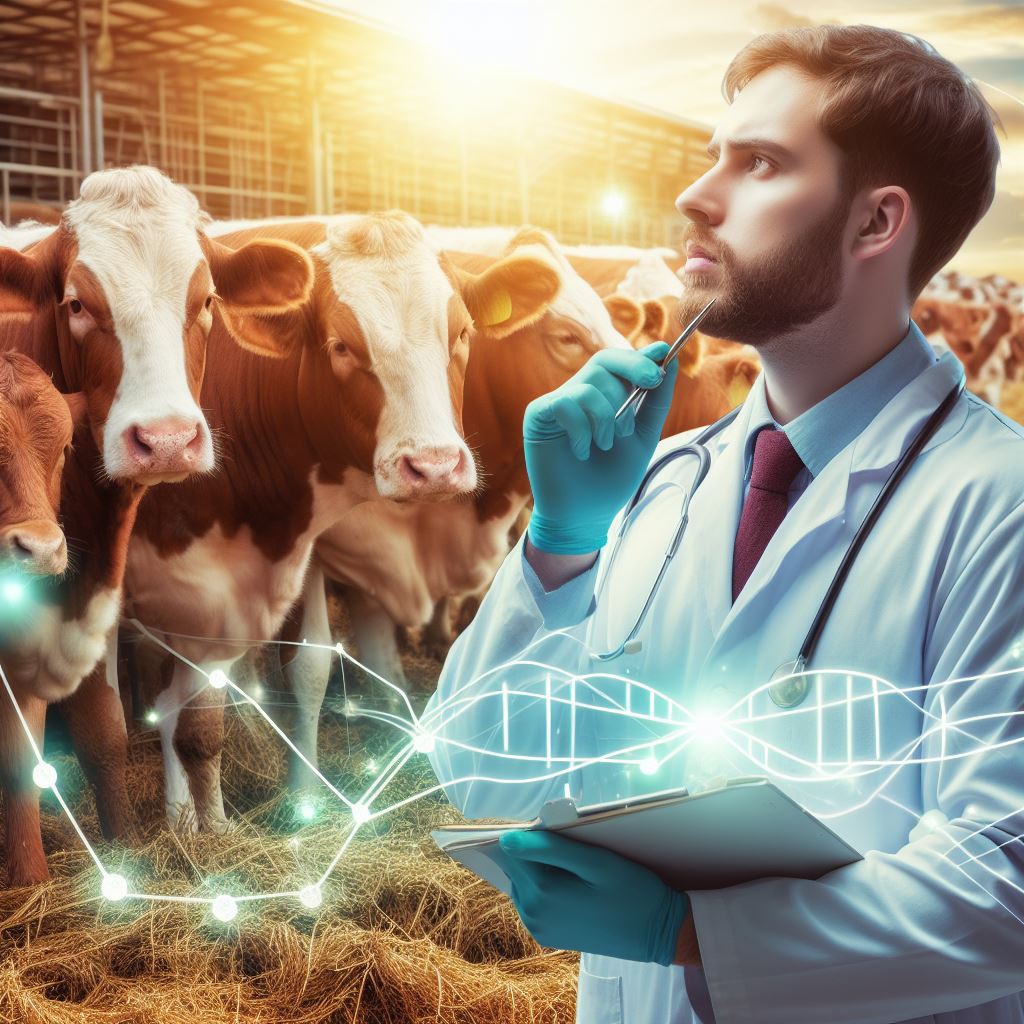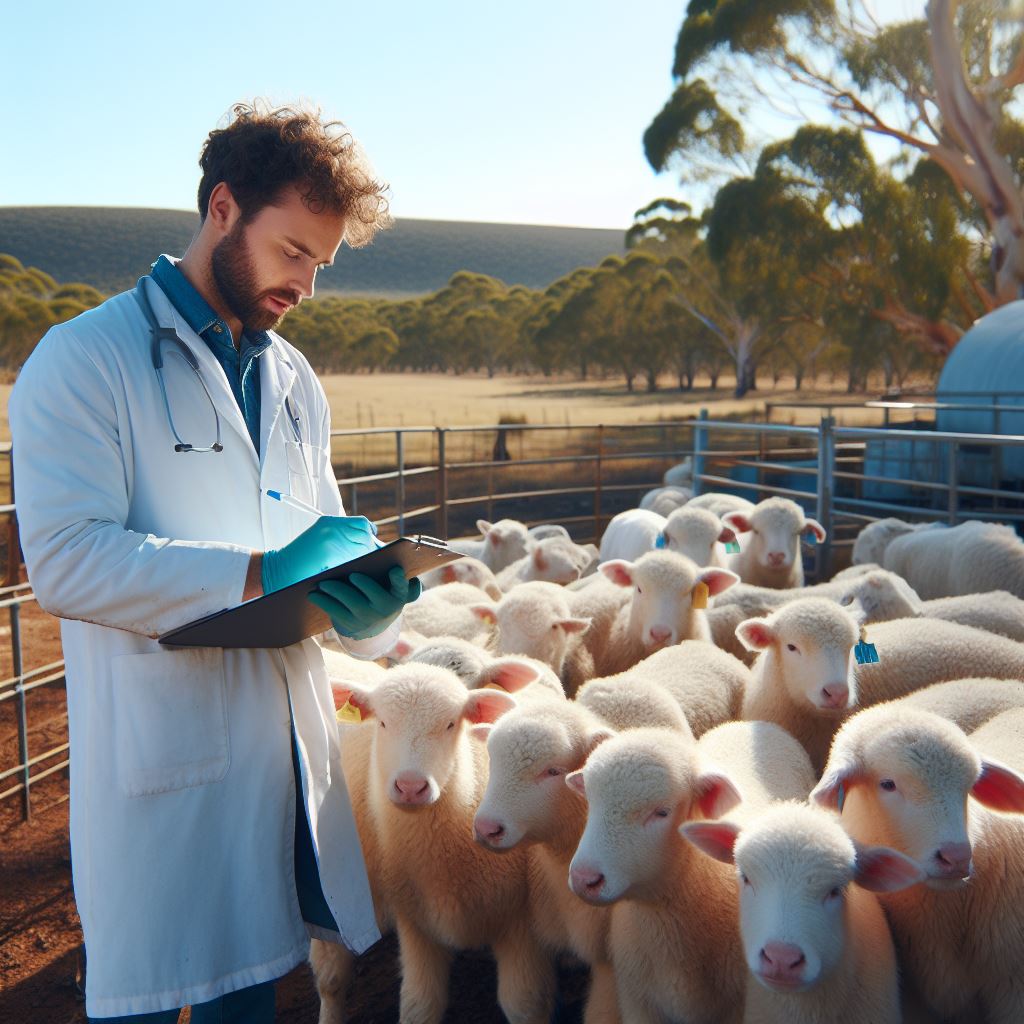Introduction
In modern agriculture, the importance of animal welfare transcends mere ethical considerations, playing a pivotal role in ensuring sustainable and efficient food production practices.
The welfare of animals is not only a moral obligation but also a cornerstone of agricultural science, influencing productivity, environmental sustainability, and societal perceptions.
Animal welfare lies at the heart of responsible agriculture, encompassing the well-being of livestock throughout their lives.
Beyond ethical concerns, ensuring optimal conditions for animals is essential for maintaining their health, productivity, and resilience to disease.
Moreover, ethical and humane treatment of animals reflects positively on agricultural practices, fostering consumer trust and loyalty.
In the realm of agricultural science, animal welfare serves as a focal point for research, innovation, and policy development.
Scientists actively investigate ways to enhance animal welfare while optimizing production efficiency and sustainability.
By integrating principles of animal behavior, physiology, and nutrition, agricultural scientists strive to design systems that prioritize the welfare of animals while maximizing agricultural productivity.
This blog post embarks on an exploration of the significance of animal welfare in agricultural science, elucidating the multifaceted aspects that contribute to its importance.
From ethical considerations to scientific advancements, we delve into the interconnected relationship between animal welfare and agricultural practices, highlighting its implications for sustainability, productivity, and societal values.
Join us on this enlightening journey as we unravel the complexities of animal welfare in the context of agricultural science, paving the way for a deeper understanding of its role in shaping the future of agriculture.
Definition and Scope of Animal Welfare in Agri Science
Explanation of animal welfare in the context of agricultural science
Animal welfare, within the realm of agricultural science, refers to the ethical and moral responsibility that farmers and researchers have towards the well-being of animals under their care.
It encompasses ensuring their physical, mental, and emotional needs are met, while also minimizing any form of unnecessary harm or suffering.
These principles are grounded in the understanding that animals are sentient beings capable of experiencing pain, pleasure, fear, and stress. Therefore, their welfare is an essential consideration when carrying out any scientific or agricultural practice involving them.
Overview of the scope of animal welfare in agri science, including farm management, veterinary care, breeding practices, etc.
Farm Management
- A crucial aspect of animal welfare in agri science is the management of farms and production systems. This includes providing appropriate housing, adequate nutrition, and access to clean water.
- Farmers must also create an environment that allows for natural behavior, such as space for movement, social interaction, and the opportunity for animals to express their natural instincts.
- Regular monitoring of the animals’ overall health and condition is necessary to ensure their well-being and promptly address any issues that may arise.
Veterinary Care
- Veterinary care plays a vital role in upholding animal welfare standards in agri science. Regular veterinary visits, preventive measures, and prompt medical attention are essential to maintain the animals’ health and prevent unnecessary suffering.
- Veterinarians are responsible for diagnosing and treating diseases, ensuring appropriate pain management, and providing necessary vaccinations or medications.
- Additionally, they play a significant role in developing and implementing herd health management plans to prevent the spread of diseases and maintain optimal animal welfare.
Breeding Practices
- The scope of animal welfare in agri science also extends to breeding practices. Responsible breeding aims to improve animal health, productivity, and overall welfare.
- Breeding should avoid any harmful genetic traits that could compromise an animal’s well-being. It should focus on selecting for traits that contribute positively to their comfort, health, and ability to thrive.
- It is essential to prioritize genetic diversity, as inbreeding can lead to increased susceptibility to diseases and other health issues.
Handling and Transportation
- Proper handling techniques and transportation practices are crucial to avoid undue stress or harm to animals. Gentle handling, appropriate equipment, and proper training of personnel are essential to minimize any potential distress during these processes.
- Transportation should ensure adequate space, ventilation, and protection from extreme temperatures. Regular breaks and access to water and food must be provided during long journeys.
Ensuring animal welfare in agri science involves a comprehensive approach that encompasses every aspect of the animal’s life, from their daily care to their role within the production system.
By actively prioritizing animal welfare, agricultural scientists and practitioners can contribute to the humane treatment of animals while simultaneously promoting sustainable and ethical practices within the industry.
Read: Youth in Farming: Australia’s New Generation
Benefits of Ensuring Animal Welfare in Agri Science
Enhanced productivity and profitability in agricultural operations
Incorporating animal welfare practices in agri science has numerous benefits, starting with the enhanced productivity and profitability of agricultural operations.
When animals are well-cared for and provided with appropriate living conditions, they are more likely to thrive and produce higher yields.
Furthermore, utilizing proper animal welfare practices in agricultural science can lead to improved reproductive efficiency in animals.
Well-maintained breeding programs, nutritionally balanced diets, and stress reduction techniques ensure optimal reproductive health, resulting in increased offspring numbers and improved productivity.
Improvement in animal health and reduction of diseases
Ensuring animal welfare in agri science also contributes significantly to the improvement of animal health and reduction of diseases.
When animals are provided with appropriate housing and nutrition, they are less susceptible to stress-related illnesses, infections, and diseases.
Additionally, regular veterinary check-ups, vaccinations, and proper hygiene practices in animal husbandry ensure early detection and prevention of diseases.
By minimizing the incidences of illnesses among animals, agri science can effectively increase overall animal health and minimize the use of antibiotics and other medications.
Enhanced reputation and marketability of agricultural products
Integrating animal welfare practices in agri science positively impacts the reputation and marketability of agricultural products.
Consumers are increasingly concerned about the ethical treatment of animals, and they actively seek out products that prioritize animal well-being.
By emphasizing and publicizing the commitment to animal welfare, agricultural businesses can differentiate themselves from competitors and appeal to conscious consumers.
A positive reputation for ethical animal treatment can lead to increased consumer trust, loyalty, and a wider customer base.
Compliance with legal and ethical standards
Incorporating animal welfare practices in agri science also ensures compliance with legal and ethical standards governing animal treatment.
Governments around the world have introduced and enforced regulations to protect animals, and it is crucial for agricultural operations to meet these requirements.
Furthermore, abiding by ethical standards is not only a legal obligation but also a moral responsibility.
Animal welfare practices in agri science demonstrate a commitment to responsible and sustainable agricultural practices, thereby gaining the respect and support of animal welfare organizations, regulatory bodies, and the general public.
Strengthened public perception and consumer confidence in the industry
Lastly, ensuring animal welfare in agri science strengthens public perception and consumer confidence in the industry. When agricultural businesses prioritize animal well-being, they demonstrate a commitment to responsible and ethical practices.
Your Personalized Career Strategy
Unlock your potential with tailored career consulting. Get clear, actionable steps designed for your success. Start now!
Get StartedThe positive public perception generated by animal welfare initiatives can lead to increased support and trust from communities.
Consumers are more likely to choose products that align with their values, and by enhancing transparency and accountability in agri science, the industry can foster long-term consumer relationships and secure a loyal customer base.
In review, animal welfare in agri science offers numerous benefits, ranging from enhanced productivity and profitability in agricultural operations to improved animal health and reduced diseases.
By prioritizing animal welfare, agricultural businesses can also enhance their reputation, comply with legal and ethical standards, and strengthen public perception and consumer confidence in the industry.
Read: Farm-to-Table Movement: An Australian Perspective
Delve into the Subject: Agri Scientist Salaries in Australia
Key Factors Influencing Animal Welfare in Agri Science
The welfare of animals in the field of agricultural science is influenced by several key factors that are crucial for ensuring their well-being and overall quality of life.
By effectively addressing these factors, animal welfare can be significantly improved, leading to healthier and happier animals.
Farm management practices
Farm management practices play a significant role in animal welfare as they directly impact the living conditions and space requirements of animals.
Providing suitable housing conditions is essential for their physical and psychological comfort. Additionally, ensuring optimal nutrition and feeding practices is vital to meet the dietary requirements of animals.
Proper animal handling techniques must also be adopted to minimize stress and injury during various farming activities.
Veterinary care and disease prevention
Veterinary care and disease prevention measures are crucial for maintaining animal welfare. Regular health check-ups and vaccinations are necessary to monitor and protect animals from illnesses.
Effective pain management must be employed during procedures to minimize any discomfort experienced by the animals.
Proper hygiene and cleanliness practices are also essential to prevent the spread of diseases and maintain a healthy environment for the animals.
Breeding and genetic considerations
Breeding and genetic considerations have a significant impact on animal welfare. Responsible breeding practices help avoid genetic diseases in animals.
Emphasizing animal well-being traits during the selection process ensures that animals with favorable genetic traits are chosen, leading to improved overall welfare in the offspring.
Environmental sustainability and resource management
Ensuring environmental sustainability and proper resource management is vital for animal welfare in agri science. Animals should have adequate access to clean water and appropriate environmental conditions to fulfill their physiological needs.
Sustainable use of resources, such as land, water, and feed, must be practiced to minimize negative impacts on animals and the overall ecosystem.
In summary, animal welfare in agri science can be significantly enhanced by addressing key factors such as farm management practices, veterinary care, breeding and genetic considerations, and environmental sustainability.
By prioritizing these factors and implementing effective measures, we can promote the well-being and quality of life for animals in the agricultural industry.
Read: Indigenous Farming Techniques in Australia

Current Challenges and Strategies in Ensuring Animal Welfare in Agri Science
The field of agri science faces several challenges when it comes to ensuring animal welfare. These challenges require strategic approaches to maintain the well-being of animals while also considering economic pressures and productivity goals.
Lack of awareness and education among farmers and industry professionals
Training programs and education initiatives are needed to address this issue.
One of the primary challenges is the lack of awareness and education among farmers and industry professionals.
Many individuals involved in agriculture may not fully understand the importance of animal welfare or may not be aware of the best practices to ensure it.
To address this issue, comprehensive training programs and education initiatives should be implemented. These programs can help farmers and industry professionals gain the knowledge and skills needed to prioritize animal welfare in their practices.
Stand Out with a Resume That Gets Results
Your career is worth more than a generic template. Let us craft a resume and cover letter that showcase your unique strengths and help you secure that dream job.
Get HiredBalancing animal welfare with economic pressures and productivity goals
Encouraging innovation and technology adoption can help achieve efficient and welfare-friendly practices.
Additionally, balancing animal welfare with economic pressures and productivity goals can be a delicate task. Farmers often face the challenge of maximizing their output while also ensuring the welfare of their animals.
To overcome this challenge, it is important to encourage innovation and the adoption of technology. By leveraging advancements in agriculture, farmers can find efficient and welfare-friendly practices that meet both economic and animal welfare goals.
These innovative solutions can range from automated feeding systems to precision livestock farming techniques.
Regulatory frameworks and industry standards
- Enforcing and updating existing regulations is crucial for animal welfare.
- Collaboration among stakeholders is necessary for continuous improvement.
Furthermore, regulatory frameworks and industry standards play a crucial role in ensuring animal welfare in agri science.
Existing regulations must be enforced and regularly updated to keep up with evolving practices and scientific advancements.
This can include requirements for housing, transportation, and slaughter methods to ensure animals are treated with compassion and respect throughout their lives.
Additionally, collaboration among stakeholders, including government agencies, animal welfare organizations, farmers, and consumers, is essential.
By working together, these stakeholders can share knowledge, exchange best practices, and collectively strive for continuous improvement in animal welfare standards.
In fact, ensuring animal welfare in agri science requires addressing current challenges and employing strategic strategies.
This involves providing education and training programs to enhance awareness, balancing economic pressures with welfare goals through innovation and technology adoption, and maintaining strong regulatory frameworks while promoting collaboration among stakeholders.
By actively addressing these challenges and implementing strategic approaches, the agri science industry can achieve sustainable and compassionate practices for the well-being of animals.
Read: The Economics of Farming in Australia Unveiled
You Might Also Like: Australian Farm Policy: Current Issues Explained
Conclusion
In closing, the paramount importance of animal welfare in agricultural science cannot be overstated.
Throughout this discourse, we have illuminated the fundamental role that ensuring the well-being of animals plays in the realm of agri-science.
At the heart of agricultural science lies a profound commitment to the welfare of animals.
Recognizing animals as sentient beings deserving of care and compassion is not just an ethical imperative but also a cornerstone of sustainable agricultural practices.
By prioritizing animal welfare, we not only uphold our moral obligations;
But also safeguard the integrity and resilience of our agricultural systems.
The multifaceted nature of animal welfare is underscored by a myriad of factors;
Ranging from housing and nutrition to healthcare and handling practices.
Throughout our exploration, we have identified key strategies to address these challenges, including implementing robust animal welfare standards, fostering education and training initiatives;
And leveraging technological advancements to enhance monitoring and management practices.
As stewards of the land and caretakers of the animals entrusted to our care, it is incumbent upon us to prioritize animal welfare in agriculture.
I urge individuals and organizations alike to heed this call to action, recognizing that our collective efforts hold the power to shape a more sustainable, ethical, and resilient agricultural industry.
Together, let us commit to fostering a culture of compassion;
Accountability, and innovation that places the well-being of animals at the forefront of agricultural practices.
In embracing this imperative, we not only honor our ethical obligations;
But also pave the way for a more harmonious coexistence between humans, animals, and the environment.
Let us embark on this journey with unwavering determination;
Knowing that our actions today will reverberate far into the future, shaping the trajectory of agriculture for generations to come.




